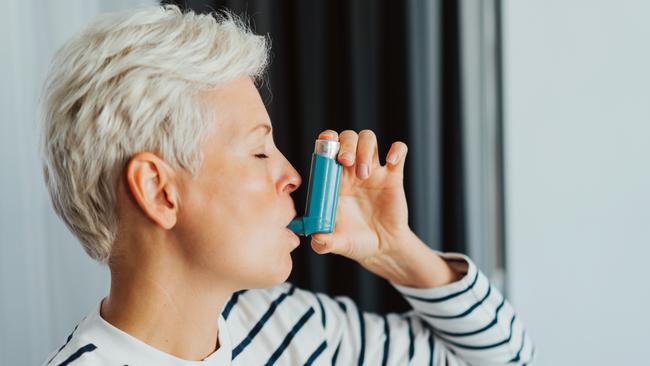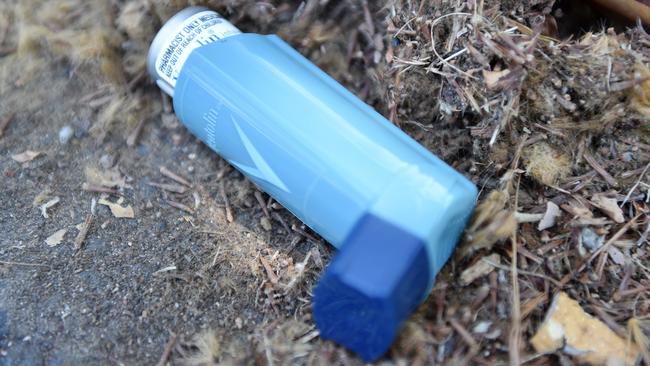Inhaler fears signal shift in asthma care
Australia may soon follow changes made to asthma treatment and management in the UK, where doctors have been advised to stop prescribing blue puffers.

Australia may soon follow changes made to asthma treatment and management in the UK, where doctors have been advised to stop prescribing blue puffers because they are not the best treatment and damage the environment.
Britain’s National Institute for Health and Care Excellence said the blue salbutamol inhalers, which in Australia are sold over the counter under the brand name Ventolin, only relieved the symptoms of asthma, rather than treated the causes.
The head of the National Asthma Council Australia said the majority of the 25 million inhalers used in Australia in 2022 were salbutamol or Ventolin.
The inhalers contain a gas that helps carry the medicine into a person’s lungs. However, that gas can harm the environment and most people don’t dispose of their devices properly.
On its website, the Royal Australian College of General Practitioners said the contribution of the devices to greenhouse gas emissions, and hence global warming, was “clear”.
It says a “typical salbutamol pressurised metered‑dose inhaler (pMDI) causes about as much global warming as the exhaust from a car driven for 300km”.
The environmental push coincides with growing evidence that Australians with asthma are too reliant on the medication.
“Salbutamol is just a short-acting reliever, which helps with the broncho constriction of the airways but does nothing for the underlying inflammation of the airways,” said clinical Associate Professor Debbie Rigby, clinical executive lead at the National Asthma Council Australia, which is expected to release updated guidelines next year.
“We have pretty good evidence that people are over-relying on their salbutamol inhaler without taking inhaled corticosteroids. That increases their risk of having a severe exacerbation and also increase their risk of needing to go to ED or hospitalisation or even death from asthma.”

An estimated 474 people died from asthma in Australia last year. It’s a figure Professor Rigby described as tragic and unnecessary and said people should have a good and up-to-date asthma management plan in place. She said patients should be using only one or two Ventolin inhalers a year, and advised anyone using more than three to speak with their doctor to discuss alternative treatment options.
Many people working in asthma research and treatment here would like to see Australia follow a similar path as the UK and update its guidance to doctors. It’s a change that could happen sooner rather than later.
The National Asthma Council is expected to release updated Australian guidelines next year. Professor Rigby wouldn’t confirm the change but said the group was aware of the UK’s update and would be “advising (guidance) in line with the current evidence”.
Clinical Professor John Blakey is the medical adviser for Asthma Australia and said he would welcome moves away from the blue inhalers. He also acknowledged any change would likely be a cause of concern for patients and suggested clear advice would also be needed to explain any change were it to happen.
“We obviously have this really big problem in Australia that you can buy salbutamol over the counter, which is not a good position to be in,” he said.
“If you get people the right diagnosis and get them on the right treatment, they use less Ventolin. If you get people on guideline-based treatment, then Ventolin is not recommended as first choice anymore, there are better treatments to use.”
Professor Blakey was also the senior author on a position paper by the Thoracic Society of Australia and New Zealand last week, highlighting the environmental harm caused by the inhalers. It called on prescribers to consider whether the devices were the best options for patients.
The updated UK guidance was provided to doctors by the National Institute for Health and Care Excellence, British Thoracic Society and the Scottish Intercollegiate Guidelines Network.
They said that instead of the blue inhalers, all patients over the age of 12 in Britain should be given newer “combination inhalers”, which contain a low dose of steroids to help to reduce inflammation in the lungs and prevent asthma attacks.
The recommendations coincide with results of a trial for a possible new treatment for people experiencing asthma attacks and those with chronic obstructive pulmonary disease.

Researchers at King’s College London trialled the use of Benralizumab to treat patients with both conditions. While the study was small, it found people treated with the drug were less likely to be admitted to hospital or require further treatment.
Professor Rigby said the findings were exciting.
“This is the first well designed study we’ve seen that shows a benefit, not for all patients, but benefit for patients having an acute exacerbation or a flare-up of asthma or COPD.”
Current routine treatments include oral corticosteroids, such as prednisone or prednisolone, which “have some long-term effects and the potential to cause other conditions like osteoporosis, type two diabetes and cataracts,” she said.
Benralizumab is already used in Australia to treat severe cases of eosinophilic asthma, but the findings of the study suggest it could be used more widely to treat flare-ups and attacks of both asthma more broadly and COPD.
Before that can happen, a larger and longer trial will need to take place to see how effective and safe the drug is in the longer term.
“It’s the concept which is really exciting,” Professor Blakey said.
“I think that there’s, in a medium to long term, there’s no reason a drug like this wouldn’t be given as the routine treatment.”
He said flare-ups and exacerbations of asthma and COPD were common and could have devastating impacts on patients, so efforts to provide improved treatments would be welcome and meaningful.
“Yes, it’s a small study, but it’s a fantastic proof of concept that you can give something else that’s not steroids, and that, as you might imagine, is not only more effective, it’s less harmful.”





To join the conversation, please log in. Don't have an account? Register
Join the conversation, you are commenting as Logout